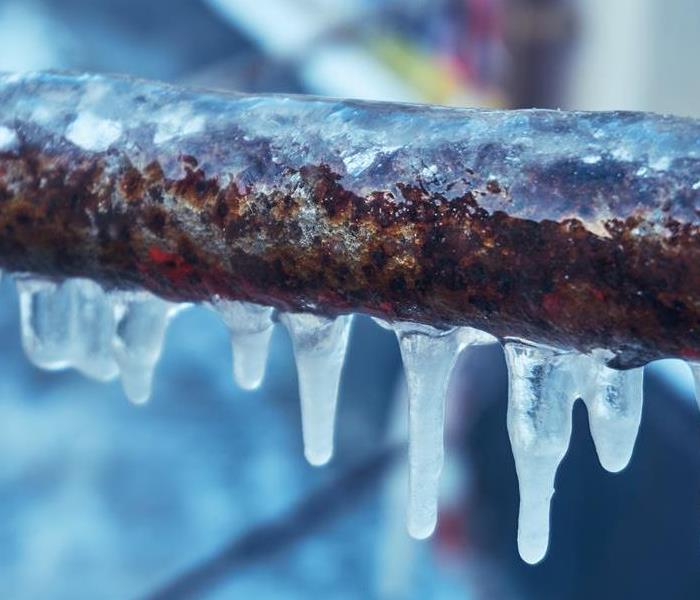Archived Water Damage Blog Posts
Navigating Water Damage Restoration in South Carolina: What You Need to Know
5/16/2024 (Permalink)
Water damage is a significant concern for homeowners in South Carolina, especially given the state's susceptibility to hurricanes, heavy rains, and flooding. Whether it's a burst pipe, a leaky roof, or storm damage, water intrusion can lead to extensive damage and pose health risks if not addressed promptly. In this blog post, we'll explore the unique challenges of water damage restoration in South Carolina and provide tips for homeowners to navigate the restoration process effectively. Below, our experts at SERVPRO® Team Cox outline the essential steps involved in water damage restoration:
The Impact of Water Damage in South Carolina
South Carolina's coastal location and subtropical climate make it prone to hurricanes and heavy rainfall, increasing the risk of water damage for homeowners. Flooding from storm surges, heavy rains, and overflowing rivers can lead to water damage in homes and properties, requiring immediate attention and professional restoration services.
Common Causes of Water Damage in South Carolina
- Hurricanes and Tropical Storms: South Carolina is vulnerable to hurricanes and tropical storms, which can bring torrential rains and strong winds, leading to flooding and water damage.
- Flash Flooding: Heavy rainfall, particularly during the hurricane season, can overwhelm drainage systems and cause flash flooding, leading to water damage in homes.
- Poor Drainage Systems: Improperly maintained or clogged gutters and downspouts can lead to water pooling around the foundation, increasing the risk of water intrusion into the home.
- Sewage Backup: During heavy rains, sewer systems can become overwhelmed, leading to sewage backup into homes and properties.
- Plumbing Issues: Leaky pipes, burst pipes, and faulty plumbing fixtures can cause water damage if not promptly repaired.
The Water Damage Restoration Process in South Carolina
The water damage restoration process in South Carolina typically involves the following steps:
- Assessment: A professional restoration company assesses the extent of the damage and develops a restoration plan tailored to the specific needs of the property.
- Water Extraction: Standing water is extracted using pumps and vacuums to prevent further damage and mold growth.
- Drying and Dehumidification: Industrial-grade dehumidifiers and air movers are used to remove excess moisture from the air and surfaces.
- Cleaning and Sanitizing: Affected areas and belongings are cleaned and sanitized to prevent mold and bacteria growth.
- Restoration: The final step involves restoring the property to its pre-damage condition, which may include repairing or replacing damaged materials such as drywall, flooring, and insulation.
Preventing Water Damage in South Carolina
While some causes of water damage are unavoidable, there are steps homeowners can take to minimize the risk:
- Maintain Gutters and Downspouts: Regularly clean and maintain gutters and downspouts to ensure proper drainage away from the home's foundation.
- Install a Sump Pump: Consider installing a sump pump in the basement or crawlspace to prevent flooding during heavy rains.
- Inspect and Maintain Roof: Regularly inspect and maintain the roof to ensure there are no missing shingles or other issues that could lead to leaks.
- Elevate Electrical Systems: If you live in a flood-prone area, consider elevating electrical systems, such as outlets and circuit breakers, to reduce the risk of water damage.
Local Regulations and Considerations
In South Carolina, homeowners dealing with water damage restoration should be aware of local regulations and considerations. This includes understanding flood zones, building codes, and environmental regulations that may impact restoration efforts. Working with a professional restoration company that is familiar with local regulations can ensure that the restoration process is compliant and efficient.
Insurance Coverage
Homeowners in South Carolina should review their insurance policies to understand their coverage for water damage. Flood insurance is not typically included in standard homeowners' insurance policies and may need to be purchased separately. Understanding your insurance coverage can help you be prepared in case of water damage and ensure that you can receive the necessary restoration services.
Choosing a Water Damage Restoration Company
When selecting a water damage restoration company in South Carolina, homeowners should consider the following factors:
- Experience: Choose a company with extensive experience in handling water damage restoration projects in the South Carolina area.
- Certifications: Ensure that the company is certified by reputable organizations, such as the Institute of Inspection, Cleaning, and Restoration Certification (IICRC).
- Local Knowledge: A company familiar with the local area will be better equipped to handle the unique challenges of water damage restoration in South Carolina.
- Emergency Response: Choose a company that offers 24/7 emergency services, as water damage can occur at any time and requires immediate attention.
- References and Reviews: Check online reviews and ask for references from past clients to ensure that the company has a reputation for providing quality service.
Community Resources and Support
In South Carolina, homeowners dealing with water damage restoration can also turn to community resources and support for assistance. Local government agencies, non-profit organizations, and community groups may offer resources, such as disaster relief programs, financial assistance, and volunteer services, to help homeowners recover from water damage.
Environmental Considerations
When dealing with water damage restoration, homeowners should also consider the environmental impact of the restoration process. Proper disposal of damaged materials, such as drywall, insulation, and flooring, is essential to prevent further environmental damage. Working with a restoration company that follows environmentally friendly practices can help minimize the impact of restoration efforts on the environment.
Long-Term Maintenance and Prevention
After completing the water damage restoration process, homeowners should focus on long-term maintenance and prevention to avoid future water damage. This includes regular inspections of plumbing systems, appliances, and roofing, as well as implementing measures such as proper drainage, sump pump installation, and monitoring indoor humidity levels.
Continued Support and Monitoring
- Regular Inspections: Schedule regular inspections of your home's plumbing, roof, and foundation to check for any signs of leaks or water damage. Catching issues early can prevent them from becoming more significant problems later.
- Monitor Humidity Levels: Keep an eye on the humidity levels in your home, especially in areas prone to moisture buildup, such as basements and bathrooms. High humidity can promote mold growth and exacerbate water damage.
- Address Maintenance Issues Promptly: If you notice any maintenance issues that could lead to water damage, such as a leaking faucet or a damaged roof, address them promptly to prevent further damage.
- Educational Resources: Stay informed about water damage prevention techniques and resources available in your area. Local government agencies, non-profit organizations, and community groups often offer workshops and educational materials on water damage prevention.
- Community Engagement: Engage with your local community to share knowledge and resources related to water damage prevention. Collaborating with neighbors can help create a more resilient community that is better prepared to handle water damage incidents.
- Professional Maintenance Services: Consider hiring professional maintenance services, such as plumbing inspections and roof repairs, to ensure that your home is well-maintained and less susceptible to water damage.
- Insurance Coverage: Review your insurance coverage regularly to ensure that you have adequate coverage for water damage restoration. Understanding your policy can help you make informed decisions in the event of water damage.
- Emergency Preparedness: Have an emergency plan in place in case of a water-related disaster. Know how to shut off the main water supply and have contact information for water damage restoration companies handy.
Educational Resources and Workshops
Homeowners in South Carolina can also benefit from educational resources and workshops offered by local government agencies, non-profit organizations, and community groups. These resources can provide valuable information on water damage prevention, emergency preparedness, and how to respond to water damage incidents effectively.
Community Engagement and Collaboration
Engaging with the local community and collaborating with neighbors can also be beneficial for homeowners in South Carolina. Sharing experiences, tips, and resources can help create a more resilient community that is better prepared to deal with water damage and other emergencies.
Water damage restoration requires careful planning, prompt action, and collaboration with professionals and community resources. By understanding the causes of water damage, knowing the restoration process, and taking preventive measures, homeowners can protect their homes from water damage and ensure a safe and healthy living environment for their families. If you are dealing with water damage in South Carolina, it's essential to act quickly and seek professional assistance to restore your home and prevent future damage. If you have suffered from water damage in your home or business, call SERVPRO Team Cox at 803-419-0470.
Preventing Frozen Pipes
12/4/2023 (Permalink)
Frozen pipes are a common issue during cold winters, and they can lead to costly water damage and the need for restoration services. As a restoration company, we've seen the impact of frozen pipes on homes. In this blog post, we'll share expert advice on preventing frozen pipes to help you avoid this headache.
Insulate Vulnerable Areas
Insulating pipes in vulnerable areas of your home is a key preventative measure. Pay close attention to unheated spaces like attics, basements, crawl spaces, and garage areas. Insulating these pipes can help keep them above freezing temperatures.
Seal Gaps and Cracks
Any gaps or cracks in your home's exterior can allow cold air to seep in and affect the temperature in your walls and floors. Properly seal these areas to prevent drafts and maintain a stable indoor temperature.
Keep Your Home Warm
Maintaining a consistent indoor temperature is essential in preventing frozen pipes. Even when you're away from home, it's wise to keep your heating system running to ensure that the interior remains warm enough to prevent freezing.
Use Pipe Insulation
Pipe insulation is an excellent way to protect your plumbing. It's readily available at hardware stores and can be installed on exposed pipes in your home. This helps maintain the temperature of the water within the pipes.
Drip Your Faucets
On particularly cold nights, allow your faucets to drip slowly. The movement of water in the pipes can help prevent freezing. This is especially important for faucets along exterior walls and those in areas prone to freezing.
Monitor Your Home's Temperature
Consider installing a temperature-monitoring system in your home. This can alert you to significant temperature drops, allowing you to act before pipes freeze. Some systems can even send notifications to your phone.
Shut Off and Drain Outdoor Faucets
Before winter sets in, shut off and drain outdoor faucets and sprinkler systems. Disconnect garden hoses and store them indoors. This prevents water from freezing in the outdoor plumbing.
Open Cabinet Doors
On very cold nights, open the cabinet doors under sinks to allow warm air to reach the pipes. This is especially important for kitchen and bathroom sinks located on exterior walls.
Preventing frozen pipes is a proactive approach to protecting your home from potential water damage and the need for restoration services. By insulating, sealing, and maintaining your plumbing, you can reduce the risk of frozen pipes and ensure a worry-free winter. If your pipes do burst, contact SERVPRO and our teams of specialists will have you back to normal as soon as possible.
Water Problems? Is it Black, Grey, or Clean?
5/31/2022 (Permalink)
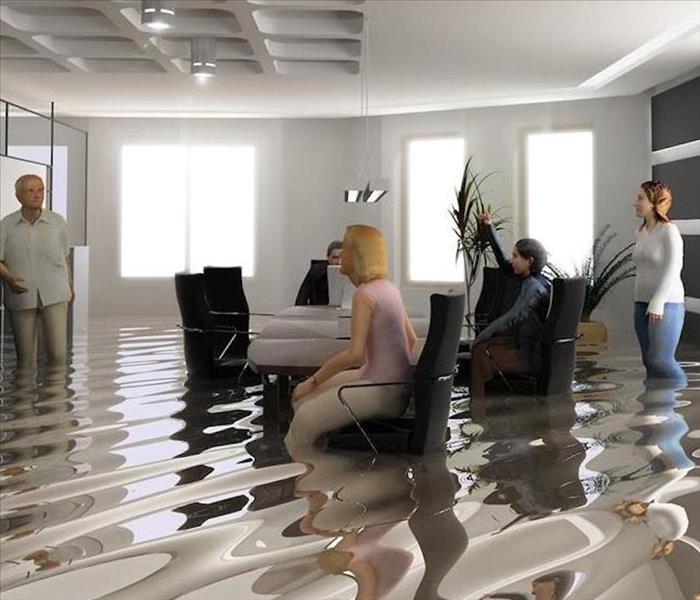 Flooded conference room in Columbia SC
Flooded conference room in Columbia SC
When it comes to cleanup and disinfection of commercial spaces, it’s best to call certified water damage restoration experts. The SERVPRO of Richland County team is trained to handle contaminated water emergencies properly and works 24/7 to help our customers get their property back to business.
It’s essential for business owners and property managers to know the different types of contaminated water. You can easily smell or see contaminates in some cases, but water can smell and look perfectly fine, but still be harmful.
Clean, gray and black water: What’s the difference?
Water damage can be classified by three types of contaminated water: clean, gray and black.
Clean water is free from viruses, bacterias and comes from a source like a broken water supply line or leaking faucet. If not treated quickly, clean water can turn into gray or black water, depending on the length of time, temperature and contact with surrounding contaminants.
Gray water, or wastewater, hasn’t come into contact with solid human waste but is still considered contaminated. It also may contain bacteria and viruses that cause discomfort or illness. Gray water drains and flows from places such as showers, sinks and baths. It also comes from overflowing washing machines, dishwashers and toilets with urine but no feces.
If done correctly, gray water can be filtered and reused for gardens and lawns; however, it also can quickly degrade if left untreated.
Black water is highly contaminated and contains harsh chemicals and human waste filled with harmful bacteria and disease-causing pathogens. You should avoid contact with black water as it can cause severe illness or death if ingested. Water is considered black when it comes from a toilet bowl with feces or sewer back-up. It’s also generated from overflowing streams or rivers mixed with sewer water and standing water with microbial growth.
Sewage cleanup and commercial water restoration
Any water contaminated with sewage backup should be considered an emergency and addressed as quickly as possible. The water may contain viruses, bacteria and other microbes that cause serious illnesses. And if black water isn’t removed promptly, it can rot, dry out and lead to airborne contamination.
SERVPRO professionals are specially trained and have the equipment and protective gear to safely restore your business. Our water damage restoration specialists will inspect your business to determine the appropriate plan of action for the type of water encountered.
We’re locally owned and operated and part of the Columbia and grater Richland County communities. Our damage restoration technicians are employees, not contractors. They can respond to sewage cleanup and water damage emergencies with the most advanced cleaning equipment, products and technology to get you back to business. To learn more, call us anytime at (803) 419-0470.
Why Do I Need a Water Removal Company?
2/22/2022 (Permalink)
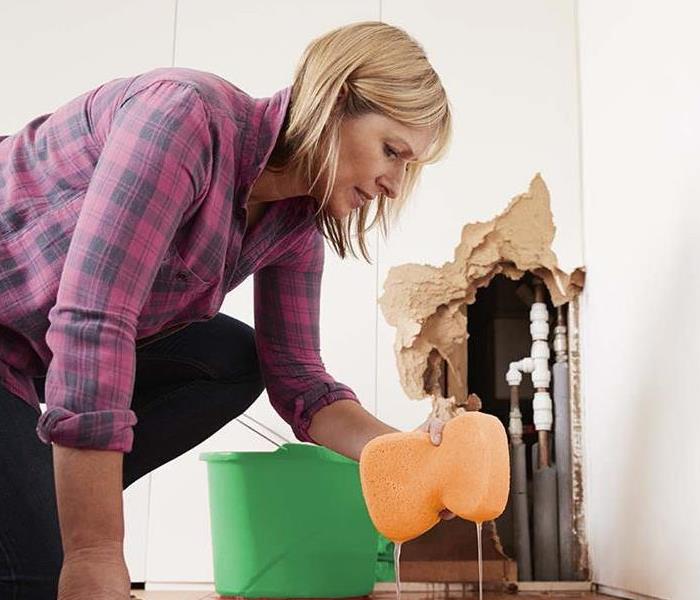 Why use Water Mitigation Company?
Why use Water Mitigation Company?
If you’re like most homeowners, you want to take care of home maintenance on your own. After all, who wants to pay for a service when you can just do it yourself? In some cases, that might be the best thing to do, but it’s also important to consult a professional restoration company when the need arises.
As a water mitigation company in Columbia SC, potential customers can sometimes call back and decide to do the clean up themselves but many have called back with new problems. Lost time, costly do-it-yourself products, and frustration can be avoided by using a professional.
Why use a Water Damage Repair and Restoration Company?
- Uncover hidden moisture issues. When it comes to water damage, there’s often more than meets the eyes. Many materials, such as hardwoods and drywall, are porous, so they absorb water. This can cause the materials to expand, or it can trap the moisture, allowing it to foster mold growth. A water mitigation company, however, has the equipment to both detect and dry these materials.
- Prevent future mold growth. Mold spores are everywhere, but they don’t pose much of a threat until they are exposed to moisture. When water damage isn’t adequately addressed, it can increase the chances of mold growth. Our team can extract and dry the water, plus we apply an antimicrobial to deter mold.
- Expertise and Equipment to handle contaminated water. Not all water damage is equal. Some water can be extremely contaminated (such as sewage or floodwaters) and poses health risks. In these cases, you’ll need protective gear and specific processes for cleaning up the damage. Our technicians are equipped and certified to handle these situations.
Water damage can come in many different forms and it’s also important to know when things are beyond your control. No matter the situation,, SERVPRO of Richland County is here to help.
Contact us at (803) 419-0470 for 24/7 Water Damage Repair and Mitigation.
How Do I Locate My Home Water Shut Off?
2/3/2022 (Permalink)
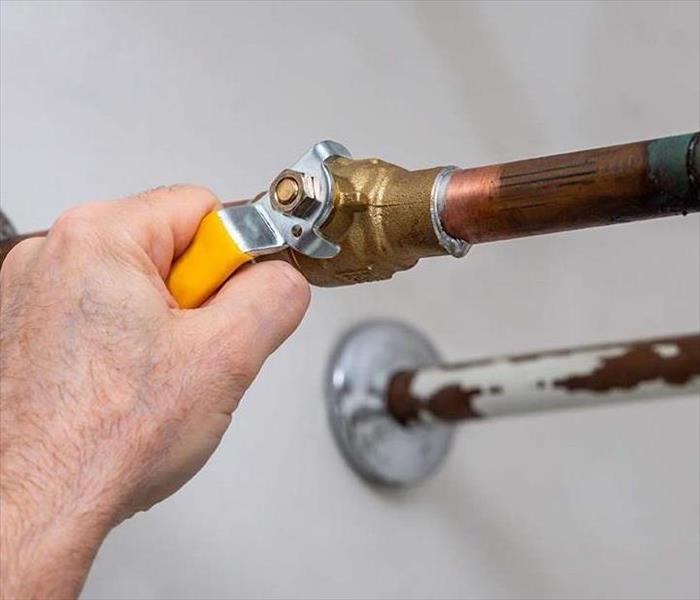 Know where your Home Water Shutoffs are located.
Know where your Home Water Shutoffs are located.
If the leak is from a sink or a toilet, it is easy to turn off the water for that line by turning the valve that is located beneath or beside the fixture. What if you're not sure where the leak is coming from? It could be a pipe behind your wall, under your home, or somewhere that is hard to locate. In this case, you should turn off the water to the whole house. This means locating the water main shutoff. Ask yourself this question, whether in your home or business. Do you know where the shutoff is located and could you locate it in the case of an emergency? If not, don't feel bad. Many people do not know where to locate their water and gas shut offs.
Typically, these shut offs lie on the exterior of the home or business around the perimeter of the building. Once you have found the shut off, make sure that all members of your household know where it is. This is exactly why we tag these main shut offs during the creation of an ERP. The quicker you are able to turn off the water, the less damage is caused.
Once located, you can add water and gas shut off tags to the appropriate shut offs. You can add these tags as a helpful reminder if you ever have an emergency in your home. For example, if a leak happens or a pipe bursts in your home, the first thought to cross your mind should be to turn off the water.
Next step? Call SERVPRO of Richland County.
If you experience water damage in your home, whether from a busted pipe, leaky roof, or natural occurrence, you can give SERVPRO of Rock Hill & York County a call at (803) 324-5780. We are always here to help!
Water Damage Repair: When It’s Time to Call a Pro
1/31/2022 (Permalink)
 Call a a professional water mitigation expert.
Call a a professional water mitigation expert.
Water Damage Repair: Do-it-yourself vs. calling the pros
Not only does water damage affect your home’s structural foundation, but it also creates an ideal environment for mold and mildew to grow, termites and carpenter ants to move in, and powerful odors to fill your living spaces. To fully restore and dry your property - and have the validation and documentation to back it up - you need specialized training and equipment. And that’s where SERVPRO comes in.
Ongoing training + latest technology = bye-bye moisture
Our local technicians are well-prepared to tackle any water damage emergencies - long before they ever set foot in your home. In addition to earning the Institute of Inspection Cleaning and Restoration Certification, they complete Employee Certification Training and a 15-day hands-on course. Continuing education classes keep the water restoration team informed on scientific drying principles and the latest technology.
Their extensive education and training come into play when they arrive at your home with all the tools they need to restore it to pre-water damage condition: Moisture detection and measurement equipment, including an infrared camera. Powerful water extraction pumps and vacuum units to speed the drying process. Industrial strength air movers and dehumidifiers to pull water vapor from the air. And thermal foggers, deodorization machines, and sanitizing agents and treatments to eliminate odors.
Tips to help prevent water damage
While our specialists are available at a moment’s notice for any water damage or restoration emergency, there are a few DIY steps homeowners can take to avoid them.
- Clean - Keep those gutters clean to ensure proper drainage and direct downspouts at least five feet away from your home. Whenever possible, slope your yard away from the foundation.
- Test - At least once a year, check your sump pump. During heavy storm seasons, test it more frequently.
- Fix - Keep on the lookout for dark spots under pipes and on ceilings. If you notice leaks or dripping pipes, get them fixed. Also, repair cracked caulking and inspect for missing, loose or damaged roof shingles.
And for Joan’s case, we’ll add one more tip: Self-care is important, but please don’t fall asleep in the bathtub with the water running!
24/7 water damage and restoration assistance
Although SERVPRO of Richland County is part of a national network of 1,700-plus franchises, we’re locally owned and operated and part of the Columbia, and Richland County communities. Our water damage and restoration experts are employees, not contractors, which means our team can respond faster to emergencies with a proven water damage restoration process and the most advanced technology and equipment. For questions, contact us anytime at (704) 286-8708 or request help online.
Quickness Is Key And SERVPRO is Quick
8/2/2021 (Permalink)
 SERVPRO Technicians are IICRC Certified and follow the drying process protocol to ensure a complete dry out.
SERVPRO Technicians are IICRC Certified and follow the drying process protocol to ensure a complete dry out.
A water heater is usually tucked away, and once it starts leaking it might not be noticed right away. Once the water fills the surrounding space it looks for an exit to spread further. This residence suffered water damage when the hot water heater began to leak. The water spread out into the hallway effecting the hardwood flooring. SERVPRO performed a Water Mitigation, and then did a complete dry out which saved the hardwood floors from having to be replaced. Special drying mats can be used to ensure not only is the hardwood dry, but the flooring underneath is completely dried as well. Moisture meters are used on a daily basis until no moisture shows on the meter.
At SERVPRO we will get you back to "Like it never even happened."
When Water Damage Affects Your Business Call SERVPRO
7/2/2021 (Permalink)
 From start to finish SERVPRO is Here to Help with water damage at your business.
From start to finish SERVPRO is Here to Help with water damage at your business.
When faced with water damage at your business it can be unsafe for you to continue standard operations until specific safeguards are in place. Contamination threats, such as bacteria or mold can arise from standing water. SERVPRO technicians are IICRC Certified and capable of addressing standing water and implementing drying solutions. Our Cleaning Technicians and Biohazard Specialists are available if needed allowing us to address saturation and exposed materials quickly, and identify which areas are most prone to mold and microbial threats to ensure the safety of your business.
Timely response to a water damage is essential in minimizing the disruption of business. SERVPRO offers 24-hour emergency water damage response.
Quickness is key and SERVPRO is prepared to get you back to “Like it never even happened.”
Frozen Pipes Thaw Causing Heavy Water Damage
5/14/2021 (Permalink)
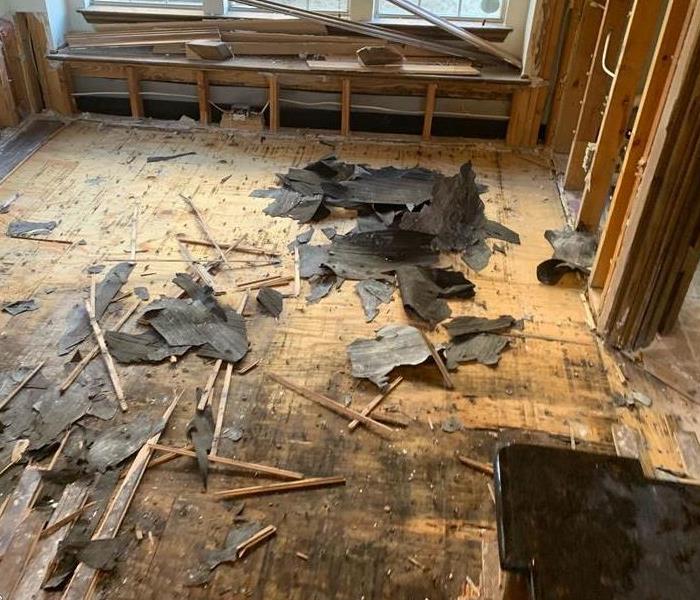 Drywall is like a wick when it comes to water damage. Flooring and drywall is removed to insure complete drying and to avoid mold.
Drywall is like a wick when it comes to water damage. Flooring and drywall is removed to insure complete drying and to avoid mold.
When the weather reports extremely low temperatures that are at freezing levels it is crucial to be sure your water lines are insulated. Unfortunately, with freezing temperatures there is the potential for loss of power. Once a line freezes it eventually will thaw causing water lines to rupture which in turn causes water damage.
First the home, or business with the water damage must quickly be evaluated for the safety of anyone in the home, or business. Be sure there is nothing electric in, or around the water damage to cause either an electrical fire, or electrocution. Make sure there are no ‘slip and fall’ hazards. If it is not safe, keep out and dial 911 for help. Once all is secure regarding safety precautions, shut off the water if you can.
Call SERVPRO for water damage to your home, or business. At SERVPRO we want to get you back to “Like it never even happened.”
Water Damage Timeline
1/20/2021 (Permalink)
Need Emergency Service? Call Us 24/7 – [[803]419-0470]
Within Minutes
- Water quickly spreads throughout your property, saturating everything in its path.
- Water is absorbed into walls, floors, upholstery, and belongings.
- Furniture finishes may bleed, causing permanent staining on carpets.
- Photographs, books, and other paper goods start to swell and warp.
Hours 1 - 24:
- Drywall begins to swell and break down.
- Metal surfaces begin to tarnish.
- Furniture begins to swell and crack.
- Dyes and inks from cloth and paper goods spread and stain.
- A musty odor appears.
48 Hours to 1 Week:
- Mold and mildew may grow and spread.
- Doors, windows, and studs swell and warp.
- Metal begins to rust and corrode.
- Furniture warps and shows signs of mold.
- Paint begins to blister.
- Wood flooring swells and warps.
- Serious biohazard contamination is possible.
More Than 1 Week:
- Restoration time and cost increase dramatically; replacing contaminated materials and structural rebuilding may be extensive.
- Structural safety, mold growth, and biohazard contaminants pose serious risks to occupants.
About SERVPRO of Richland County
SERVPRO of Richland County specializes in the cleanup and restoration of residential and commercial property after a fire, smoke or water damage event. Our staff is highly trained in property damage restoration. From initial and ongoing training at SERVPRO’s corporate training facility to regular IICRC-industry certification, rest assured our staff is equipped with the knowledge to restore your property
Water-Damage-Restoration
1/20/2021 (Permalink)
When Hurricane Florence hit South Carolina, SERVPRO of Richland County helped our local residents and businesses with their water damaged properties. If recent storms have caused flooding or a pipe has burst, our highly trained technicians are ready 24 hours a day, 7 days a week, to respond immediately to flood or water damage at your Richland County property. We have the experience, expertise, and training to restore your home or business quickly and properly. We use advanced inspection and extraction equipment to find the water and remove it as quickly as possible. Our local technicians will closely monitor and document the drying process to ensure your property is back to normal. We are the professionals, that make it. "Like it never even happened." We are always here to help. So give us a call! (803)419-0470
Where Are Your Water Shut-Off Valves?
1/20/2021 (Permalink)
When is the best time to locate your water shut-off valves? NOT when you’re experiencing a water damage! Take some time and familiarize yourself with the location and function of these valves should you ever need to turn off the water in your home.
- Main Water Shut-Off Valve – typically found in the basement or an outside wall. This valve connects your water providers lines to your home. Remembering the location of this valve in the event of a water emergency, is vital.
- Behind Each Toilet – if you notice water leaking around your toilet or in the bathroom, look for a knob behind the toilet on the wall. Turn the valve in the direction shown to close it and restrict water from flowing to the toilet.
- At the Water Heater – each water heater is slightly different. Read the manual that was provided with your water heater for specific instructions.
- Sink Shut-Off - locate the knob or lever beneath the sink where your pipes are located. Turn the knob clockwise or the lever to the off position.
- Street-Side Shut-Off – the underground box that connects your home to the water supply. This box will contain a meter as well as a point to turn the supply of water to your home, off. It does typically require a special tool that can be purchased at hardware stores.
Columbia Residents: We Specialize in Flooded Basement Cleanup and Restoration!
11/13/2020 (Permalink)
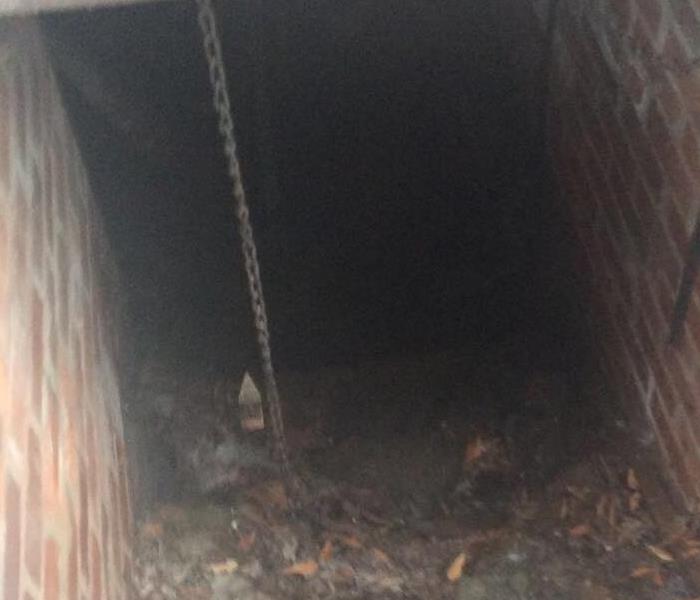 This Columbia home’s basement flooded due to heavy rains.
This Columbia home’s basement flooded due to heavy rains.
A basement can flood at any time, although flooding most often occurs during heavy rainfall. Basements are inherently prone to flooding because they are the lowest level of a building and are normally built partly or entirely below ground level. There are a number of reasons why your Columbia basement could flood, including:
- A blocked or failed sewer lateral pipe
- Heavy rain causes surface water to pool around your home
- Storm sewer backup
- Sanitary sewer backup
- Foundation drainage failure
- Water supply-line break or hot-water tank failure
- And many more
No one plans on a disaster, but when it does happen. You can call on the service professionals her at SERVPRO of Richland County. We get it right the first time, every time. Call now! (803)419-0470
Water in a Restaurant? We got you covered!
7/27/2020 (Permalink)
Owning a restaurant can be a very rewarding experience, but also filled with many obstacles. With multiple sinks, toilets, and a dish washing machine, as well as natural weather occurrences, the potential for water damage within your business is high. Water or flood damage in your restaurant can cripple your business and make it unsafe for you to continue standard operations until specific safeguards are in place. Contamination threats, such as bacteria or mold, that can arise from standing water, could close your doors immediately. To protect your restaurant and keep business flowing after a water damage, call the professionals at SERVPRO of Richland County. We have water restoration experts capable of addressing standing water and implementing drying solutions, as well as cleaning technicians and biohazard specialists if needed to ensure the safety of your restaurant.
Timely response to a water damage is essential in minimizing the disruption of business. SERVPRO of Richland County offers 24-hour emergency water damage response, allowing us to address saturation and exposed materials quickly, and identify which areas are most prone to mold and microbial threats. We have a full line of potent antimicrobial products that can help to eliminate mold spores present on surfaces and protect them from potential colonization.
Removing any standing water in a timely fashion is necessary to not only protect the building your business operates in, but also your investment in the furniture, fixtures, and equipment in the restaurant. From wooden legs of chairs and tables, to bases of booths, and carpets & upholstery, prolonged exposure to excessive moisture can warp and distort these structures to the point of requiring replacement. SERVPRO of Richland County has industry leading drying and extraction equipment and to give your restaurant the immediate attention it needs.
Call SERVPRO of Richland County today at (803) 419-0470 for your Clean Up and Restoration needs, We’re Here to Help!
We Answer the phone ready to help
10/21/2019 (Permalink)
We understand that when you call us, you may be feeling confused, stressed, and vulnerable. You need an expert to guide you through this crisis. SERVPRO of Richland County has the specific water damage training and experience to help you through this tough time. We specialize in water damage restoration—in fact, it's the cornerstone of our business.
What to Expect
When you call, we will ask several questions regarding your water damage emergency. These questions will help us determine what equipment and resources to bring, including how many trained SERVPRO Professionals may be needed.
Our SERVPRO Representative will ask several questions:
- Your name and contact information
- Your insurance information (if applicable)
- The street address of the water-damaged home or business
- When did the flooding or water damage occur?
- What caused the water damage (if known)?
- Is there electricity available (on-site)?
About SERVPRO of Richland County
SERVPRO of Richland specializes in the cleanup and restoration of residential and commercial property after a fire, smoke or water damage event. Our staff is highly trained in property damage restoration. From initial and ongoing training at SERVPRO’s corporate training facility to regular IICRC-industry certification, rest assured our staff is equipped with the knowledge to restore your property.
SERVPRO of Richland County 24 Hour Emergency Water Damage Services
4/22/2019 (Permalink)
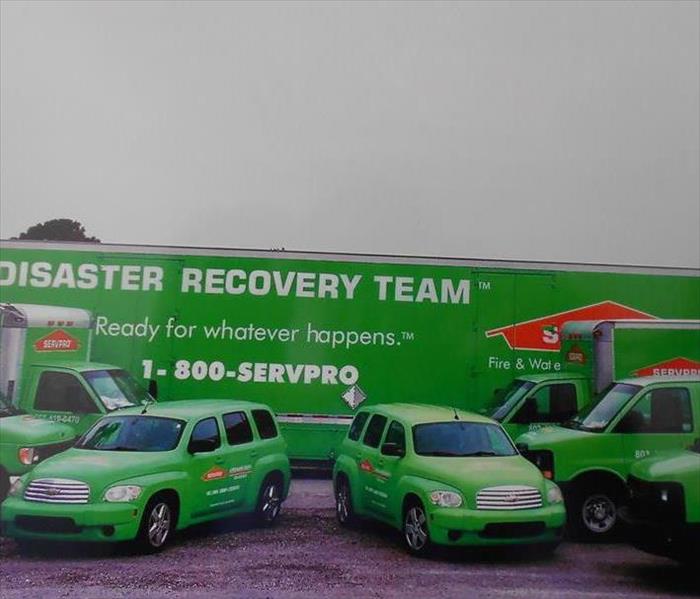 SERVPRO of Richland County!
SERVPRO of Richland County!
SERVPRO of Richland County is available 24 hours a day for water emergencies, large or small. When you are dealing with water damage, immediate action is crucial. A delay of just a few hours can greatly increase the severity of the water damage.
We Answer the Phone Ready to Help
Call Today - (803)419-0470
We understand that when you call us, you may be feeling confused, stressed, and vulnerable. You need an expert to guide you through this crisis. SERVPRO of Richland has the specific water damage training and experience to help you through this tough time. We specialize in water damage restoration—in fact, it's the cornerstone of our business.
What to Expect
When you call, we will ask several questions regarding your water damage emergency. These questions will help us determine what equipment and resources to bring, including how many trained SERVPRO Professionals may be needed.
Our SERVPRO Representative will ask several questions:
- Your name and contact information
- Your insurance information (if applicable)
- The street address of the water-damaged home or business
- When did the flooding or water damage occur?
- What caused the water damage (if known)?
- Is there electricity available (on-site)?
About SERVPRO of Richland County
SERVPRO of Richland County specializes in the cleanup and restoration of residential and commercial property after a fire, smoke or water damage event. Our staff is highly trained in property damage restoration. From initial and ongoing training at SERVPRO’s corporate training facility to regular IICRC-industry certification, rest assured our staff is equipped with the knowledge to restore your property.




 24/7 Emergency Service
24/7 Emergency Service

